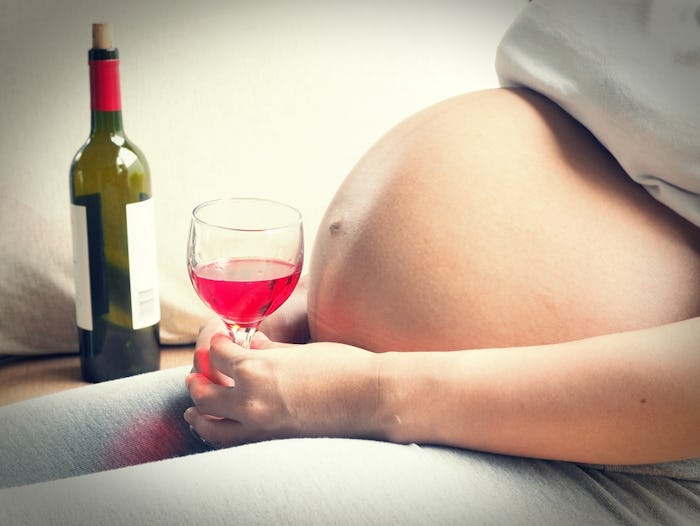Life
Study Says Light Drinking While Pregnant Could Be Safe, But Is It?
You're at brunch, your mimosa-loving friend refrains from ordering one this time around, and you immediately know: She's pregnant! Avoiding alcohol is one of the first steps to ensuring a healthy pregnancy, right? Well, according to U.K.-based researchers, it's not that simple. Apparently, light drinking during pregnancy could be OK, but there's still such a limited amount of information on the matter.
Drinking alcohol while pregnant increases the risk that a baby will be born with Fetal Alcohol Spectrum Disorder (FAS), potentially causing "lifetime, irreversible effects that can result in physical, mental, and neurobehavioral birth defects," according to the American Pregnancy Association. Given these dire circumstances, one would think that a mimosa would be (literally) off the table.
So how much alcohol is safe during pregnancy, and what quantity has been found to be harmful? According to The Bristol University team of researchers, there just aren't enough other studies on the topic to have a conclusive answer. The studies analyzed included participants who drank no more than 32 grams of alcohol per week. A glass of wine has about 10 grams, so pregnant women consumed no more than three drinks per week, then.
Published in the BMJ Open journal on Monday, the study, according to author and health epidemiologist Luisa Zuccolo "compared drinking once or twice a week [at low levels] compared to not drinking at all," ultimately finding a "10 percent increased risk of preterm birth," as NPR reported. Such a small margin is hardly conclusive, so it's not really possible at this time to ascertain whether or not the alcohol caused the minimal risk.
Even after reviewing 5,000 studies and settling in on 26 "acceptable" ones, researchers asserted that they still need more information before giving light drinking the green light. "Our extensive review shows that this specific question is not being researched thoroughly enough," shared Senior Research Associate Dr. Loubaba Mamluk, according to the study, while still admitting: "We found limited evidence for a causal role of light drinking in pregnancy, compared with abstaining, on most of the outcomes examined."
What are moms-to-be to do, then? In a word: abstain. "There is no safe level of alcohol use during pregnancy," David Garry, a maternal-fetal medicine specialist at Stony Brook University Hospital, told NPR. Given that interactions between alcohol and pregnancy aren't fully researched yet, it's definitely not a gamble worth taking. Even though light drinking wasn't linked to birth defects in these cases, the drinking did appear to cause smaller babies and more preterm births.
Research findings like these can be easily misinterpreted. The suggestion that light drinking during pregnancy might have few adverse effects is by no means equivalent to the assertion that moderate drinking has no effects whatsoever. Slacking on the two-drink restriction could give way to three or four drinks — the implications of which were not measured by Bristol researchers.
Though a "clear answer" regarding the safety of light drinking during pregnancy hasn't been articulated, one thing's for sure: Heavy drinking while pregnant can be disastrous for a fetus. In addition to FAS, birth defects and neurological disorders may also occur. Again, why risk impacting the long-term health of your baby for a couple of glasses of wine per week?
At the end of the day, the conversation about this topic must continue and more focused studies should be carried out. If, in fact, conclusive evidence determines that a glass or wine of two per week is an OK limit for pregnant women, then women and their doctors can decide whether drinking alcohol while pregnant is a good idea. For optimal fetal health, though, remember to err on the side of caution and stick with virgin cocktails when brunching with friends.
Check out Romper's new video series, Romper's Doula Diaries:
